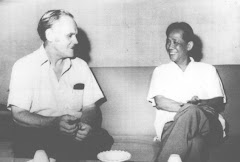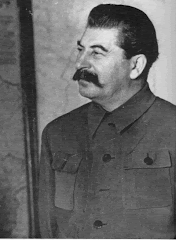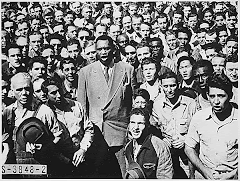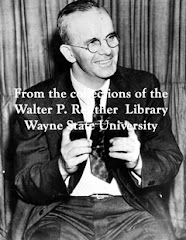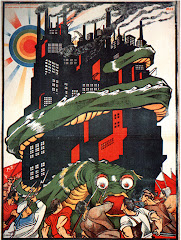Sunday, January 8, 2012
In Darwins shadow, a socialist pioneer of evolution
A free e-book by Alfred Wallace, "The Wonderful Century Reader:
http://books.google.com/books?id=2KUzAAAAMAAJ&pg=PA369&lpg=PA369&dq=Alfred+Wallace+and+The+Plunder+of+the+Earth&source=bl&ots=MJ0KVDTnw4&sig=WyD3HqamttfuxH7cDfYA54TwoC8&hl=en&sa=X&ei=ID0KT4L-BtCRgQeXl42NAg&ved=0CEMQ6AEwAw#v=onepage&q&f=false
The man was writhing in the grips of Malaria. A torrent of tropical rain beat on the roof of his Indonesian hut. In the calm interludes between the sweats and chills, he wrote about ideas — big ones. It was 1856, and naturalist Alfred Russel Wallace was writing about how species evolve.
Little known today, Wallace went on to become the co-discoverer, with Charles Darwin, of the theory of natural selection, the engine behind evolution. And he became a socialist.
Who was this overshadowed scientific pioneer?
Wallace left school early to work as a surveyor. He loved to read, and England’s public libraries, not pubs, were his university. He was fascinated when he heard a presentation by socialist Robert Owen in a workingmen’s Hall of Science. While working in Wales, he found himself in the midst of the insurrectionary Rebecca Riots of 1842-43. These experiences left their political mark.
In 1848, Wallace’s interest in natural history led him to Manaus, deep in Brazil’s Amazon River Basin. While he contemplated the origins of species, he needed to earn a living, and it was dangerous. He collected insects, birds and other specimens along the Amazon and Black Rivers and sold them to interested parties. One of his customers was Charles Darwin.
After four years in the Amazon contemplating the variety among animals of the same species, he decided to return to England. He made his way to the port city of Pará with parrots, other birds and detailed notes of his experiences and observations. Disaster struck when his ship, the Helen, caught fire. A combustible balsam cargo had ignited. While he escaped in a lifeboat, his precious specimens and notes were lost.
Undaunted, Wallace journeyed to the tiny island of Ternate, among the Spice Islands of Indonesia in 1854. More collecting and observing wildlife led to his 1858 paper, “On the Tendency of Varieties to Depart Indefinitely from the Original Type.” He mailed it to someone he felt would be most interested — Charles Darwin.
Darwin was astonished that this young collector had independently thought through, as he had, how species evolve. Darwin had kept his thoughts on this mostly to himself, knowing the explosiveness in Victorian England of a materialist explanation of species’ origins. Now there was a chance he could be “scooped.” Some friends of Darwin’s, botanist Joseph Hooker and geologist Charles Lyell, moved to protect their friend.
Both Darwin’s and Wallace’s papers were read on July 1, 1858, at the Linnean Society in London. They were among six other papers read that night. Not many took notice. It was a yawner. Meanwhile, Wallace was still collecting insects in New Guinea to make a living. Darwin, due to family fortune and some timely investments, was not burdened as Wallace was by the need to earn money. So he set to work. His famous “Origin of Species” (1859) was the result.
Charles Darwin is correctly referred to as the father of modern biology. He collected mounds of evidence for evolution and its associated theories. He experimented on worms and barnacles. He wrote prolifically. But he also tipped his hat to Wallace in “The Origin of Species.” He quoted from an 1855 paper of Wallace’s: “Every species has come into existence coincident both in space and time with a pre-existing closely allied species.” Darwin wrote that Wallace and he agreed that this was “descent with modification” in action.
Wallace was respectful of Darwin and his work. In 1882, he was a pallbearer at Darwin’s funeral. But he also differed from the famous biologist in some important ways. While both saw the importance of the environment, it was Wallace who developed this more in his later writing. And he did it from a working-class perspective. Note this sentence from his 1909 paper “The Plunder of the Earth”: “The struggle for wealth, and its deplorable results … have been accompanied by a reckless destruction of the storied-up products of nature, which is even more deplorable because more irretrievable.”
Wallace was the first president of the Land Nationalization Society of England. His advanced political ideas helped him avoid the pitfalls that trapped other 19th century evolutionists. Edward Bellamy’s utopian “Looking Backward” convinced Wallace of the socialist alternative. He opposed social Darwinism and eugenics. He understood that class-driven economics and politics, not biology, had much to do with the corruption and injustices of society.
While we give Darwin his due, is it Alfred Russel Wallace’s socialist views that keep his 21 books out of print? The political left, and especially those in the environmental movement, should read more of this far-seeing worker naturalist.
http://books.google.com/books?id=2KUzAAAAMAAJ&pg=PA369&lpg=PA369&dq=Alfred+Wallace+and+The+Plunder+of+the+Earth&source=bl&ots=MJ0KVDTnw4&sig=WyD3HqamttfuxH7cDfYA54TwoC8&hl=en&sa=X&ei=ID0KT4L-BtCRgQeXl42NAg&ved=0CEMQ6AEwAw#v=onepage&q&f=false
The man was writhing in the grips of Malaria. A torrent of tropical rain beat on the roof of his Indonesian hut. In the calm interludes between the sweats and chills, he wrote about ideas — big ones. It was 1856, and naturalist Alfred Russel Wallace was writing about how species evolve.
Little known today, Wallace went on to become the co-discoverer, with Charles Darwin, of the theory of natural selection, the engine behind evolution. And he became a socialist.
Who was this overshadowed scientific pioneer?
Wallace left school early to work as a surveyor. He loved to read, and England’s public libraries, not pubs, were his university. He was fascinated when he heard a presentation by socialist Robert Owen in a workingmen’s Hall of Science. While working in Wales, he found himself in the midst of the insurrectionary Rebecca Riots of 1842-43. These experiences left their political mark.
In 1848, Wallace’s interest in natural history led him to Manaus, deep in Brazil’s Amazon River Basin. While he contemplated the origins of species, he needed to earn a living, and it was dangerous. He collected insects, birds and other specimens along the Amazon and Black Rivers and sold them to interested parties. One of his customers was Charles Darwin.
After four years in the Amazon contemplating the variety among animals of the same species, he decided to return to England. He made his way to the port city of Pará with parrots, other birds and detailed notes of his experiences and observations. Disaster struck when his ship, the Helen, caught fire. A combustible balsam cargo had ignited. While he escaped in a lifeboat, his precious specimens and notes were lost.
Undaunted, Wallace journeyed to the tiny island of Ternate, among the Spice Islands of Indonesia in 1854. More collecting and observing wildlife led to his 1858 paper, “On the Tendency of Varieties to Depart Indefinitely from the Original Type.” He mailed it to someone he felt would be most interested — Charles Darwin.
Darwin was astonished that this young collector had independently thought through, as he had, how species evolve. Darwin had kept his thoughts on this mostly to himself, knowing the explosiveness in Victorian England of a materialist explanation of species’ origins. Now there was a chance he could be “scooped.” Some friends of Darwin’s, botanist Joseph Hooker and geologist Charles Lyell, moved to protect their friend.
Both Darwin’s and Wallace’s papers were read on July 1, 1858, at the Linnean Society in London. They were among six other papers read that night. Not many took notice. It was a yawner. Meanwhile, Wallace was still collecting insects in New Guinea to make a living. Darwin, due to family fortune and some timely investments, was not burdened as Wallace was by the need to earn money. So he set to work. His famous “Origin of Species” (1859) was the result.
Charles Darwin is correctly referred to as the father of modern biology. He collected mounds of evidence for evolution and its associated theories. He experimented on worms and barnacles. He wrote prolifically. But he also tipped his hat to Wallace in “The Origin of Species.” He quoted from an 1855 paper of Wallace’s: “Every species has come into existence coincident both in space and time with a pre-existing closely allied species.” Darwin wrote that Wallace and he agreed that this was “descent with modification” in action.
Wallace was respectful of Darwin and his work. In 1882, he was a pallbearer at Darwin’s funeral. But he also differed from the famous biologist in some important ways. While both saw the importance of the environment, it was Wallace who developed this more in his later writing. And he did it from a working-class perspective. Note this sentence from his 1909 paper “The Plunder of the Earth”: “The struggle for wealth, and its deplorable results … have been accompanied by a reckless destruction of the storied-up products of nature, which is even more deplorable because more irretrievable.”
Wallace was the first president of the Land Nationalization Society of England. His advanced political ideas helped him avoid the pitfalls that trapped other 19th century evolutionists. Edward Bellamy’s utopian “Looking Backward” convinced Wallace of the socialist alternative. He opposed social Darwinism and eugenics. He understood that class-driven economics and politics, not biology, had much to do with the corruption and injustices of society.
While we give Darwin his due, is it Alfred Russel Wallace’s socialist views that keep his 21 books out of print? The political left, and especially those in the environmental movement, should read more of this far-seeing worker naturalist.






